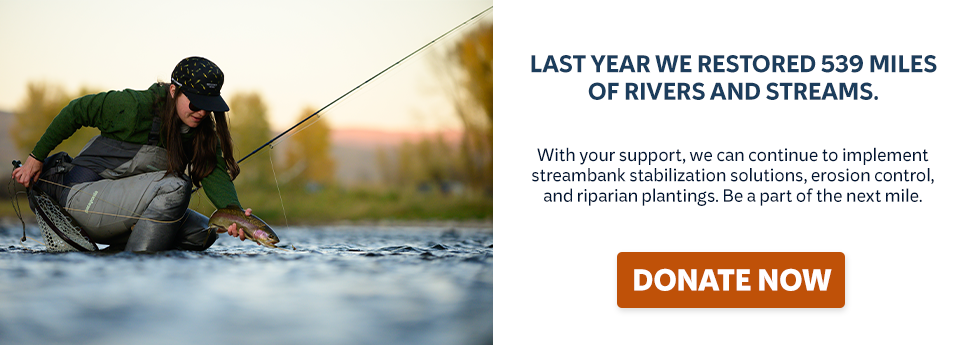FOR IMMEDIATE RELEASE:
Contact: Erin Mooney, National Press Secretary (703) 284-9408
Trout conservationists applaud EPA/U.S. Army Corps of Engineers initiative to restore Clean Water Act protections
Agencies guidance is a key first step for restoring fundamental protection to nations waterways.
Milwaukee, Wisc.–Trout Unlimited commends the Obama Administration and its Clean Water Act agencies, the U.S. Army Corps of Engineers (Corps) and the Environmental Protection Agency (EPA) for taking an important step today to begin restoring Clean Water Act protections to streams and wetlands. These waters provide critical habitat to fish and wildlife, flood control, drinking water and help provide billions of dollars in economic benefit to the nations communities.
The proposed guidance issued today by the agencies will more clearly define which U.S. waters are subject to Clean Water Act protections. It is a critical step on the road to restoring longstanding protections for many of the nations wetlands, streams, lakes and headwaters that have been vulnerable to pollution and destruction since the SWANCC (2001) and Rapanos (2006) Supreme Court decisions. These cases and agency guidance issued in 2003 and 2008 jeopardize critical waters and fish and wildlife habitat. Taken together, they removed protections for at least 20 million acres of wetlands, particularly prairie potholes and other seasonal wetlands essential to waterfowl populations throughout the country. Also at risk are intermittent streams that provide critical habitat for fish, especially trout and feed into the public drinking water systems for more than 117 million Americans.
The city of Milwaukee and the state of Wisconsin know the value of clean water and healthy fish habitat, so it is entirely fitting for the agencies to announce good news for clean water on the banks of the Menomonee River in Milwaukee, said Jon Christiansen, Chairman of TUs Board of Trustees and Milwaukee resident. The foundation of much of our fish habitat conservation work is firm but fair implementation of the Clean Water Act and you cannot implement the Clean Water Act effectively if you leave some of our most valued waters unprotected, said Christianson.
Restoring protections for these waters directly benefits the people of Wisconsin and all Americans because it helps to provide jobs, drinking water and good fishing, said Chris Wood, President and CEO of Trout Unlimited. The economic benefits from these wetlands and streams are staggering: the U.S. Fish and Wildlife Service found that wildlife-dependent recreation in the United States generates $80 billion in hunting and fishing expenditures annually and in Wisconsin, fishing and hunting produce $2.9 billion in economic benefits, said Wood. From Ashland to LaCrosse to Milwaukee, Wisconsinites appreciate the value of clean water and good fishing, said Wood.
The proposed guidance takes a moderate approach that falls within the limits of the two Supreme Court decisions. For example, it generally excludes roadside ditches, gullies or small washes from coverage under the Clean Water Act and does not apply to ponds and other ornamental bodies of water constructed by excavating dry land. Moreover, the proposed guidance does not affect any of the existing exemptions in the Clean Water Act for a wide range of farming and forestry activities, including plowing, cultivating and seeding and the construction and maintenance of stock ponds and logging roads. The agencies are soliciting a 60-day public comment period on the proposal.
Another key feature of the proposal is that it makes a promise to proceed to a rulemaking in a timely fashion. Therefore, as the guidance is being finalized and put into place, the agencies will begin a full rulemaking process, which will provide yet another period for public review and comment and a more lasting mechanism for implementing the law.
Trout Unlimited is a private, non-profit organization with more than 4,300 members in Wisconsin and 140,000 members nationwide who are dedicated to conserving, protecting and restoring North Americas trout and salmon fisheries and their watersheds.

